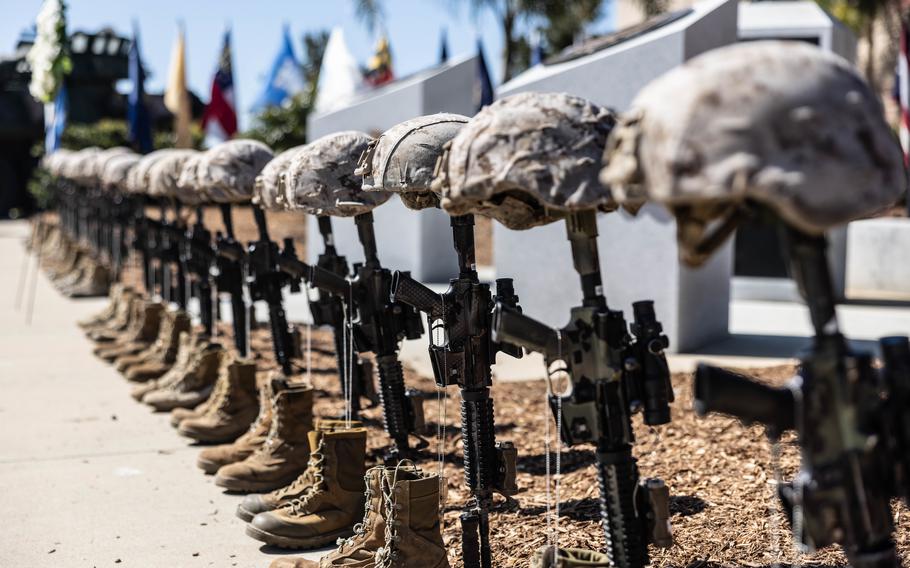
Battlefield crosses representing Marines from 1st Light Armored Reconnaissance Battalion, 1st Marine Division who gave their lives during Operation Iraqi Freedom stand in front of a memorial during a 20th anniversary commemoration ceremony that the battalion held at Marine Corps Base Camp Pendleton, Calif., on March 18, 2023. The battalion held the ceremony to honor those lost during OIF and to remember the battalion’s successes during the Iraq War. (Cameron Hermanet/U.S. Marine Corps)
WASHINGTON — The Senate voted Wednesday to end authorizations for the use of military force against Iraq as Congress moves to reassert its power over the launch of U.S. military campaigns.
Senators voted 66-30 to rescind a 2002 authorization that approved the eight-year Iraq War to topple the regime of Saddam Hussein and a 1991 authorization that sanctioned the U.S.-led Gulf War after Iraq invaded Kuwait.
The repeals coincided with the 20th anniversary of the U.S. invasion of Iraq and followed years of efforts by lawmakers to close the open-ended resolutions that allowed presidents to take military action against a country that the U.S. now considers a strategic partner. Congress last used its constitutional authority to declare war in World War II and has since passed resolutions authorizing the use of military force largely at the request of the president.
“We live with the possibility every day that our men and women in uniform could be called away to fight. ... We dread for that moment to come. But if it does, we must be certain that the American people are united behind the decisions we make here and that our intentions are clear to our military commanders,” said Sen. Todd Young, R-Ind., who led the drive to repeal the authorizations alongside Sen. Tim Kaine, D-Va. “By reclaiming our war powers, by restoring the open, civil but passionate debates about matters of war and peace we’ll do exactly that.”
The White House has endorsed the termination of the Iraq War authorizations and said it would have no impact on current military operations. About 2,500 U.S. service members remain stationed in Iraq to help battle the remnants of the Islamic State terrorist group and provide support for American troops in Syria.
It is unclear whether the House will bring the bill repealing the authorizations to a vote. The lower chamber approved the rescindment of the 2002 authorization in 2021 but the House is now under Republican control and could be more reluctant to take up the legislation.
Senate Majority Leader Chuck Schumer, D-N.Y., said last week that there were signs members of the House’s senior leadership feel “very strongly” in support of the bill even though House Speaker Kevin McCarthy, R-Calif., voted against the legislation two years ago.
Republican opponents of nullifying the authorizations have argued it would make the U.S. look weak to its enemies, particularly Iran and the militias it backs throughout the Middle East. They also note former President Donald Trump’s administration cited the 2002 authorization when carrying out a 2020 drone strike in Baghdad that killed Iranian Gen. Qassem Soleimani.
“Passing this legislation would create a power vacuum in the Middle East that could be filled by Iran, Russia and China,” Sen. John Cornyn, R-Texas, argued Monday. “We’d be ceding the region back to competition after working for years to promote stability.”
Democrats have pushed back against those claims. Sen. Bob Menendez, D-N.J, pointed to last week’s U.S. airstrikes against Iran-linked militants in Syria as proof the White House does not need the legal framework provided by the Iraq authorizations to take action against threats in the region. The strikes were launched in retaliation for an Iran-backed drone attack on a U.S.-led coalition base in Syria that killed a U.S. contractor and injured five American service members and another contractor.
The bill approved by the Senate on Wednesday does not apply to the 2001 authorization for use of military force that gave the president broad permission to deploy military force against those involved in the Sept. 11 attacks and pursue the war on terror. The 2002 authorization was largely granted on false assertions by former President George W. Bush’s administration that Iraq was developing weapons of mass destruction and harbored members of al-Qaida, the terrorist group that carried out the World Trade Center and Pentagon attacks.
Nearly 5,000 American service members were killed in the Iraq War, which succeeded in ousting the Hussein regime but sparked widespread sectarian violence and resulted in the deaths of hundreds of thousands of Iraqis.
Sen. Tammy Duckworth, D-Ill., who lost both her legs fighting in Iraq, said Congress had shirked its responsibility to troops by failing to repeal the Iraq measures long after the war ended in 2011.
“We’ve left our troops without a clearly defined mission and now they face an increasing risk that a future commander in chief may improperly interpret the law to send them into armed conflicts that these AUMFs were never intended to authorize,” she said. “Our troops deserve better than that. If we choose to send our finest into battle, then we here in these halls need to debate and vote to do so based on current conditions.”